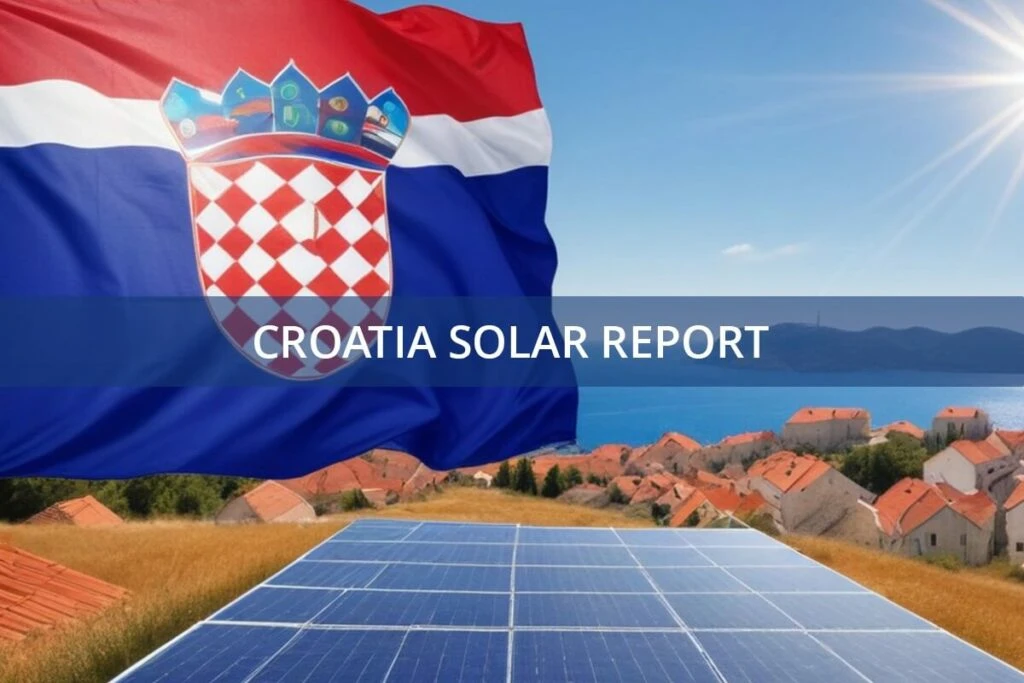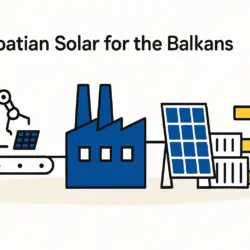In late September 2025, Croatia achieved a significant milestone in its renewable energy sector. The solar power plant in the city of Belišće became the first in the country to be connected to both the Croatian and Hungarian electricity networks. This accomplishment marks a major step forward in Croatia’s energy diversification efforts and its commitment to expanding its renewable energy infrastructure.
Solar Power Plant in Belišće: Powering Croatia solar energy 2025
The solar power plant, located in the city of Belišće, has a power output of 33 MW and is connected to a 110 kV substation. This connection to both the Croatian and Hungarian electricity networks marks a significant milestone for the country. The plant is the first in Croatia to integrate into the electricity markets of both nations, thereby enhancing its potential to contribute to the region’s energy mix.
The construction of the solar power plant in Belišće began in early 2024 and was completed in May 2025. This initiative was part of Croatia’s broader strategy to diversify its energy sources and reduce its dependence on fossil fuels. The plant is expected to play a key role in achieving the country’s goals of increasing the share of renewable energy in its electricity mix. Croatia is on track to exceed 1 GW of solar power capacity by 2025, marking a significant milestone in its renewable energy journey.
Impact on Energy Diversification with Croatia solar energy 2025
The successful integration of the solar power plant into both the Croatian and Hungarian electricity networks is a significant step forward for Croatia’s energy diversification efforts. By connecting to the Hungarian network, Croatia can export excess electricity generated from the solar power plant, thereby creating new opportunities for revenue generation and strengthening its position in the regional energy market.
The project also aligns with the European Union’s goals of increasing cross-border electricity trade and improving energy security across member states. By connecting to the Hungarian network, the solar power plant in Belišće contributes to the EU’s vision of a more interconnected and resilient energy grid.
Advancements in Renewable Energy: Croatia solar energy 2025
The rise of solar energy in Croatia is part of a broader trend of increased investment in renewable energy sources across the country. In recent years, Croatia has seen a surge in the development of new solar power plants, with several projects currently under construction or in the planning stages. The country’s abundant sunlight and favourable climate conditions make it an ideal location for solar energy production. Croatia has established several key regulations to support the growth of solar panel production and the broader renewable energy sector, detailed in this market insights report.
In addition to the solar power plant in Belišće, several other solar projects are expected to come online in the coming years, further contributing to Croatia’s renewable energy capacity. These projects will help the country meet its renewable energy targets and reduce its carbon footprint, thereby aligning with the European Union’s climate goals. One such project is a 386 MW Solar PV Power Project, developed by Enlight Renewable Energy, which is currently in the permitting stage and is expected to enter commercial operation in 2026.
Future Prospects for Renewable Energy in Croatia solar energy 2025
The successful integration of the solar power plant in Belišće into the Croatian and Hungarian electricity networks sets a positive precedent for future renewable energy projects in Croatia. The country’s government has expressed its commitment to further expanding its renewable energy infrastructure, with plans to increase the share of solar and wind energy in the national electricity mix. Croatia’s solar power target is 2.5 GW by 2030.
As Croatia continues to invest in renewable energy, it is expected to play a more prominent role in the regional energy market. The country’s strategic location and growing renewable energy capacity make it an attractive partner for neighbouring countries looking to diversify their energy sources and reduce their reliance on fossil fuels. The Port of Rijeka, for example, offers a key logistical advantage for solar manufacturing, with access to EU markets.
The integration of the solar power plant in Belišće into the Croatian and Hungarian electricity networks is a major achievement for Croatia’s renewable energy sector. This milestone not only strengthens the country’s energy diversification efforts but also contributes to the European Union’s goals of a more interconnected and sustainable energy grid. With continued investment in renewable energy, Croatia is poised to become a leading player in the regional energy market.



